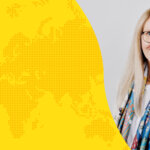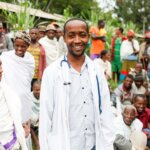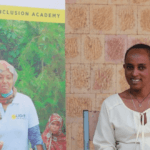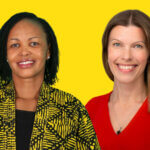Welcome Marion!
We gave everyone the chance to send in questions about things they wanted to know about our new incoming CEO Marion Lieser. During a delightful conversation, we asked Marion your questions and got to know her a little better. This is what she had to say!
Why did you decide to take on the post of CEO of Light for the World?
I have been involved with the Global Justice Agenda for a long time. Important topics of the Global Justice Agenda are inclusion and the rights of people with disabilities. This also includes access to health services as well as to social services in general. These issues have always accompanied me, especially during my work in countries where I was responsible for various programmes. As a result I could gain a lot of expertise in this area. Now I am honoured to be able to put this at the service of Light for the World.
My vision is a just world. Not just a fairer world, no, I strive for a truly just world. That is a world where every person can live a life of freedom; without poverty and without discrimination.
Marion Lieser
What is your vision for your work with Light for the World?
My vision is a just world. Not just a fairer world, no, I strive for a truly just world. That is a world where every person can live a life of freedom; without poverty and without discrimination. When that is achieved, organisations like Light for the World will no longer be needed. Unfortunately, we all know that there is still a long way to go. Therefore, we can only try to achieve as much as possible in our lifetime to leave the world to our children as a better place than as we found it.
What is your most German habit?
Punctuality 😉
What are your impressions of Vienna?
My only impression of Vienna is honestly the team and that is quite wonderful. I am very satisfied; I’ve been very warmly welcomed, and I feel right at home.
What have been the most rewarding moments of your career, and why?
Well, I’ve been working for quite some time, and I think every job had something really rewarding, but one thing I was truly happy about was when I was working in Uganda, and I planned the construction of a youth training centre. To see a piece of land with nothing on it and to propose a vision – a training centre for marginalised people – and then to go there two years later and open it. That was quite a rewarding moment.
When did you hear from Light of the World for the first time?
The first time I came across Light for the World was when I was working for the German Foundation for World Population, and I was visiting a women’s project in Nepal. When I arrived, there was a rural hospital where an eye doctor was performing operations, and this doctor was celebrated like a god. There were flowers and music, and people were so pleased. So, of course, as a curious person, I wanted to know what was happening. They explained that this person was an ophthalmologist, and that was the first time I saw Light for the World in action.
What kind of tips would you give those who want to become leaders tomorrow?
You don’t really learn to become a leader, and it’s not something you decide to do from one day to another. It’s a process where you start witnessing leaders in your own environment, whether they are your superiors or your political representatives. Seeing them take actions that you can support and want to embrace is one side. The other is witnessing activities where you feel that you would do that differently and reflect on it accordingly. This allows you to develop your own personal style and become your individual self. As a colleague and at a later stage as a leader. For me, this is the only way to become an authentic leader, and if you can’t be an authentic leader, you fail because you are not yourself and leadership has to come from the heart. At least, that’s my belief.
How can we make gender transformation a reality for Light for the World?
I think, in general, to become a feminist or a feminist leader, it’s important that you’re aware of your own privileges, that you reflect on your actions and decisions, and that you refrain from going into a “defence mode” when confronted with criticism. Part of feminism is sometimes to take a step back, reflect and then come up with a conclusion. I think this kind of awareness is something which takes time. Often, feminism is seen as something which excludes men, but that is not the case. It’s not just about gender – it’s about reflecting on power and power relations. It’s about engaging in reflective processes and helping people not slip into this defensive mindset as it would block progress. It is important to get everyone on board to succeed jointly.
How do you switch off after an intense day at work?
Breathing! I took breathing classes, and breathing has become a very important part of my life: it helps me to prepare myself or relax after an intense day of work. Sometimes when you are in challenging situations or meetings, you don’t have the time to take a one-hour walk, for example. So, breathing exercises are beneficial for me.
As a CEO, I want the people I’m working with to care for their well-being. That means that colleagues are not expected to constantly work overtime and that everyone takes the holidays when they are due.
Marion Lieser
What have you learned about keeping a healthy work-life balance, especially during the pandemic?
I think it is very important for everyone to achieve a work-life balance at an early age as this is key to your mental and physical health. As a CEO, I want the people I’m working with to care for their well-being. That means that colleagues are not expected to constantly working overtime and that everyone takes the holidays when they are due. Everybody has a different balance-system: some like to take four weeks of holidays all at once, some like to have a couple of long weekends. It’s not one size fits all. In order to ensure that Light for the World continues to be an attractive employer – a place for people to stay on board and enjoy the organisation’s success – the underlying issue is work-life balance. That’s what I firmly believe, and I think it is important for everybody, including me.
How do you balance your successful career with family and small kids?
I think logistics is one part. So, I always plan everything through. I also have a wonderful husband who, for example, was the accompanying spouse when we went to Tanzania. It was nearly impossible to get an accompanying spouse visa for a male person at that time. And it was hilarious because we had to find a way to get him the stay permit, because it was not foreseen in the law that a man accompanies a wife. So that was something interesting to start with. Also, our youngest child was eight weeks at the time we moved to Dar Es Salaam and I worked fulltime. My husband would always come in the first 12 month of our stay to my office at lunchtime, with the baby on his arm, so I could feed. When the baby was older, some people saw my husband and said that they hardly recognize him without the baby in his arm. It is important that people see hands-on what women can do, but equally important also what men can do different and that certain things which are sometimes still labelled as unmanly are respected, valued and appreciated by society.
How will Light for the World benefit from your training as a qualified social worker?
I can say that being trained as a social worker opens your eyes to many things and makes you perceive people in your work environment and beyond different, than if you were trained in a profession which has less the human beings and their interaction at heart. You clearly see the value in humanity and focus on it.
What steps will you take to continue our process of internationalizing and modernizing, while making sure our work remains accessible to all?
That is a critical issue and points to the major areas I will have to concentrate on when I join as CEO in August.
Part of the answer to your question will be the work we do in preparation for our strategic plan. The current strategic plan will run out in 2023, and we should get prepared for the next 5-year or 10-year plan. So, for example, when you say modernisation – that includes for example embracing digitalisation or various younger age groups coming on board. And a lot more. All that should be addressed within a comprehensive strategy.
It also needs to be decided what direction in terms of growth the organisation shall and can take.
This balance between the vision on one side and the content together with the enabling finances on the other side will need to be discussed in developing the solid future strategy of Light for the world. And I am looking forward to having these discussions within the organization and implementing any needed changes accordingly. Together with this wonderful and competent team I met here!
Part of our vision is reaching the hardest to reach. How important is that for you and how do you think they can be reached?
Thank you for this question. The hardest to reach are often affected by extreme poverty. And no matter the issue, whether it is providing vaccinations or informing on reproductive health topics, there is always this last little stretch to reach those most in need. There is not one recipe on how to reach those in need that you can just pull out of your pocket and then replicate; instead, it is important to rely on existing expertise, expertise in countries where programmes take place. This is where the knowledge of our partner organisations through whom Light for the world implements programmes is vital. Especially, when you are talking about reaching people with disabilities who are living in extreme poverty, their skills are irreplaceable.
Too often, development organisations from the north do not listen to the available expertise and instead try to bring their own solutions, which simply do not work. Therefore, I take listening very seriously, because it makes our programs and all of us better.
Which books do you love to read?
I like to read fiction, and I also like to read crime stories.
My favourite author is Henning Mankell. His book “Italian shoes” comes to mind – it is touching, dramatic, and a life story around vulnerability, courage and forgiveness.
Do you have a song that you can sing by heart?
A poem would be much easier for me… I’m not such a great singer, but there is a beautiful Swahili song called “Zaeni Matunda Mema”, which means a lot to me. I love the melody so much that I wrote it down. We sang it at my wedding and the baptism of the children. It’s a song about the beginning, of bringing goof fruits to the world. I think it’s my favourite song because it’s so extremely positive. There is so much hardship in the world… if you have an upbeat song in your heart and mind… it helps!





